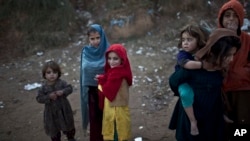Pakistan says it wants an early repatriation of Afghan refugees in the country but does not intend to forcefully evict them. Meanwhile, Afghan officials are warning that unwarranted pressure on the refugee population as part of Islamabad’s increased counterterrorism measures could hinder bilateral ties.
Pakistan hosts nearly three million Afghan refugees that have fled decades of conflict in neighboring Afghanistan. While the refugee population has long been seen as a burden on the struggling national economy in the wake of dwindling foreign financial resources, they are increasingly being linked to the rise in criminal and extremist activities in Pakistan.
A deadly militant attack on a school in Peshawar last month that killed 134 children and 16 staff members has prompted Pakistani authorities to intensify counterterrorism measures. They include, among other steps, registration of Afghans living as illegal migrants and those who have been registered as refugees in cities being pushed to move back to their identified refugee camps.
‘Process has to start’
Speaking in Islamabad Wednesday, Pakistani advisor on national security and foreign policy Sartaj Aziz explained the situation.
"We have about 1.7 million registered refugees and another 1.3, 1.4 million unregistered refugees. Now, obviously if they have to go by the end of 2015, they can't go all in December 2015, and the process has to start. We are in touch with the U.N. High Commission for Refugees to facilitate those refugees who want to go back voluntarily to areas that are peaceful and can absorb them," said Aziz.
A trilateral agreement involving Pakistan, Afghanistan and the U.N. agency for refugees, the UNHCR, gives Afghan refugees until the end of this year to go back to their country. But continuing conflict and security concerns coupled with a lack of economic opportunities in Afghanistan have slowed the repatriation process.
Stronger incentives needed
Pakistani advisor Aziz says that relations with Afghanistan have seen significant improvement in recent months, and the two sides are working closely to address the refugee issue. He says that under a U.N. voluntary repatriation program, a large number of Afghans have gone back to their country but more needs to be done to speed up the process.
"We are working with the Afghan government to create stronger incentives as a part of the overall international cooperation. We can [gradually] build houses for people.… in areas where they want to go so that they have a better living condition. So, how many as a result of these measures will be able to go between now and the end of December is difficult to say, but the important thing is that it is a voluntary process at the moment, [that] there is no forcible eviction of anybody," said Aziz.
However, Afghan officials tell VOA that the refugee population has particularly come under pressure since the Peshawar school attack and authorities have launched an “indiscriminate” crackdown on Afghans leading even to “mass arrests.” These officials say that even those possessing valid refugee documents are being harassed, warning that the policy will negatively impact bilateral ties that have only recently seen improvement.
Local media reports that Afghans are also being forced out of jobs and homes in urban centers because they have become increasingly vulnerable.
A majority of Afghans in Pakistan live in Khyber Pakhunkhwa province where the school attack occurred. The crackdown on the refugee population comes even though the Pakistani Taliban claimed responsibility for the school bloodshed. U.N. officials have also expressed concern, saying targeting Afghan refugees will have counterproductive effects.
“[Afghan] refugees are also victims. They fled their country because of war and terrorism and we should not forget this fact that they are innocent victims and we should not victimize again by abusing their human rights and making them forcibly return,” said Maya Ameratunga, UNHCR chief in Pakistan.
She stressed the need for protecting rights of registered Afghan refugees citing international commitments and Pakistan’s own policy, saying it is a civilian population that has been a victim of war and persecution.




